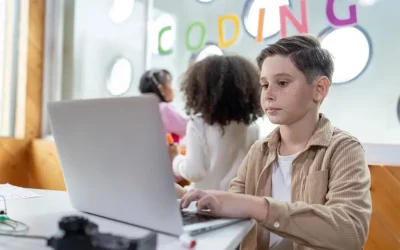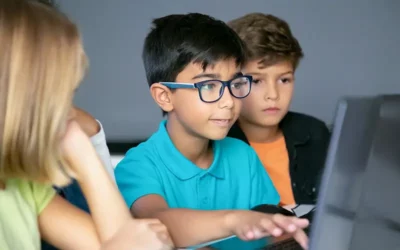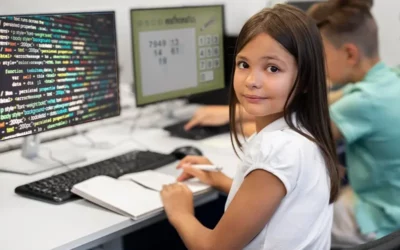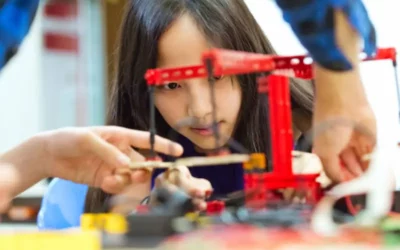Unleashing your child’s potential through coding bootcamps goes beyond simply teaching them how to write lines of code. It fosters a growth mindset, cultivates computational thinking, and encourages teamwork and collaboration. By equipping children with coding skills, we prepare them for a future where technology plays an increasingly significant role across various industries.
Recognizing the importance of coding education for children, numerous coding bootcamps have emerged, offering immersive and engaging learning experiences designed specifically for young learners. These coding bootcamps provide a structured curriculum, expert guidance, and hands-on projects to help children develop a strong foundation in programming concepts.
In this blog we will explore how coding bootcamps benefits your kids. We will learn how they work and also talk about the top coding bootcamps for your kids. So, let’s get started!
Table of contents
- Introduction
- Why Your Child Should Attend a Coding Bootcamp
- How Coding Bootcamps Work
- Top Coding Bootcamps for Kids
- Choosing the Right Coding Bootcamp for Your Child
- What Your Child Will Learn at a Coding Bootcamp
- Empowering Your Child’s Future: The Power of Coding Bootcamps
- Conclusion
- Frequently Asked Questions
Introduction

Coding bootcamps are immersive learning experiences that provide focused training on programming languages, web development, data science, or other relevant topics. They are known for their accelerated learning approach, which condenses the curriculum into a short duration, typically ranging from a few weeks to a few months.
Coding bootcamps aim to bridge the gap between traditional education and industry demand by providing practical, job-ready skills.
How coding bootcamps can benefit children
As children grow up in an increasingly tech-driven society, equipping them with coding skills, even during summer camps for kids, can pave the way for future success. Coding bootcamps, once primarily designed for adults, have now emerged as an excellent option for children to learn coding efficiently and effectively. Let’s explore how coding bootcamps can benefit young learners and open doors to exciting opportunities.
Early Technology Exposure:
Coding bootcamps expose kids to technology at a young age, fostering their creativity and curiosity. Kids can gain a thorough understanding of how technology functions by participating in hands-on coding exercises and projects.
Early exposure to programming can pique a child’s curiosity and inspire them to investigate other facets of computer science, such as game development, app development, and web design.
Problem-Solving and Logical Thinking:
Coding bootcamps help kids develop their problem-solving and logical thinking skills. Problem-Solving and Logical Thinking. Complex issues must be divided into smaller, more manageable tasks when programming.
Kids that take on coding difficulties grow in analytical thinking and acquire methodical problem-solving techniques. These problem-solving abilities are applicable to many facets of life, giving kids a priceless skill set for upcoming endeavors.
Improved Creativity and Innovation:
Coding is a creative endeavor that enables kids to materialize their innovative concepts. Kids can release their creativity through coding bootcamps by creating interactive websites, creating games, or creating mobile applications.
Young programmers have a sense of aesthetics through adopting design and user experience concepts, which encourages creativity and unconventional thinking.
Collaboration and communication:
Coding bootcamps frequently promote participant cooperation and teamwork. Children have the chance to work on group projects while discussing thoughts and working together to overcome coding obstacles.
This cooperative setting fosters efficient interpersonal communication, builds interpersonal skills, and fosters a sense of community. In today’s linked world, when cooperation and efficient communication are essential to succeed, these abilities are crucial.
Why Your Child Should Attend a Coding Bootcamp

As a parent, you may wonder how you can prepare your child for success in an increasingly technology-driven society. One effective solution gaining popularity is coding boot camps for kids. In this blog, we will explore the value of coding skills in today’s job market and why your child should consider attending a coding bootcamp.
Navigating the Digital Age:
Having a solid background in coding is similar to having a command of a universal language in a time when technology permeates every area of our life. Your youngster can interact, invent, and create in the digital world if they know how to code.
Coding bootcamps give students an immersive and practical learning experience that gives them the skills they need to succeed in the modern world, or even exploring options like a gaming summer camp, these programs provide valuable learning opportunities that can shape their future endeavors.
Future-Proofing Careers:
Around the world, technology is changing several industries, and demand for knowledgeable coders is rising rapidly. You are investing in your child’s employability by enrolling them in a coding bootcamp.
Employers in several industries, including software development, data analysis, artificial intelligence, cybersecurity, and web design, highly value coding abilities. Your child will have a competitive advantage in the job market if you arm them with these abilities at a young age.
Promoting Innovation and Entrepreneurship:
Coding bootcamps encourage young minds to think beyond the box and let their imaginations run wild. These programmes foster an entrepreneurial mindset by giving people a place to experiment and innovate.
Your child will receive the knowledge and abilities necessary to develop into a self-sufficient problem-solver and innovator by learning how to translate concepts into concrete things.
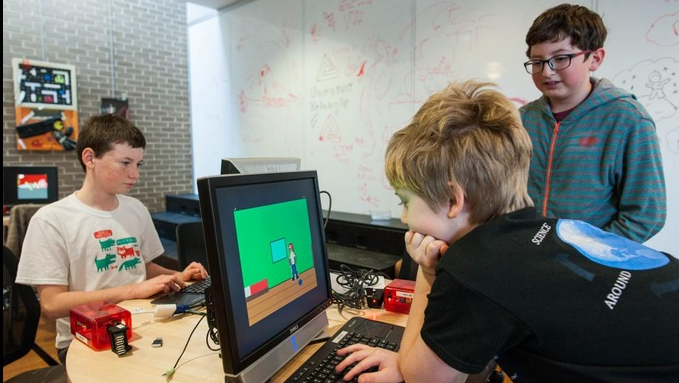
How Coding Bootcamps Work
Coding abilities are becoming more and more important for success in a variety of sectors in the modern digital world. Coding bootcamps, which are intensive educational programmes created to give people useful coding skills quickly, have evolved in response to this need.
Coding bootcamps for children are becoming more and more popular as coding bootcamps for adults have. This blog will examine the operation of coding bootcamps with an emphasis on the structure and format of coding bootcamps for children.
Coding Bootcamps for Kids:
Coding bootcamps for kids follow a similar concept to their adult counterparts but are tailored to suit the needs and learning styles of young minds. These bootcamps introduce children, typically aged 8 to 18, to the world of coding through interactive and engaging activities. The curriculum is carefully designed to foster creativity, problem-solving, and logical thinking. the coding lessons for kids provided in these boot camps creates the base for coding journey.
Format and Structure:
Pre-Assessment:
Children may be required to undergo a pre-assessment before enrolling in a coding BootCamp or making an account on the best coding apps for kids to gauge their current knowledge and abilities. This aids instructors in assessing students’ skill levels and choosing the right beginning point.
Duration:
Coding bootcamps for children often last a few days to a few weeks. Depending on the programme and the breadth of the curriculum, the timeframe may change.
Curriculum:
Starting with fundamental ideas and progressively moving on to more difficult subjects, the curriculum is designed to be progressive and age-appropriate. Depending on the topic of the bootcamp, children are introduced to coding languages like Scratch, Python, JavaScript, or HTML/CSS.
Hands-on Projects:
Projects that Kids Can Apply Their Newly Acquired Knowledge To: Bootcamps place a strong emphasis on projects that Kids Can Apply Their Newly Acquired Knowledge To. These tasks could involve producing video games, websites, or interactive software.
Small Class Sizes:
Coding bootcamps for kids keep class sizes small to guarantee individualized attention and efficient learning. This enables instructors to cater to specific needs and offer direction throughout the program.
Experienced Teachers:
Certified teachers who are experts in both teaching and coding engage closely with the students, offering advice, responding to inquiries, and giving comments. Their responsibility is to provide a welcoming and encouraging learning atmosphere.
Collaborative Learning:
Many coding bootcamps for youngsters promote teamwork and collaboration. Similar to real-world programming environments, group projects and activities promote strong teamwork and communication skills.
Progress Tracking:
Throughout the course of the program, bootcamps frequently use techniques to monitor each child’s development. Regular exams, code challenges, and project reviews are a few examples of this. Monitoring progress gives children a sense of accomplishment and identifies areas that need work.
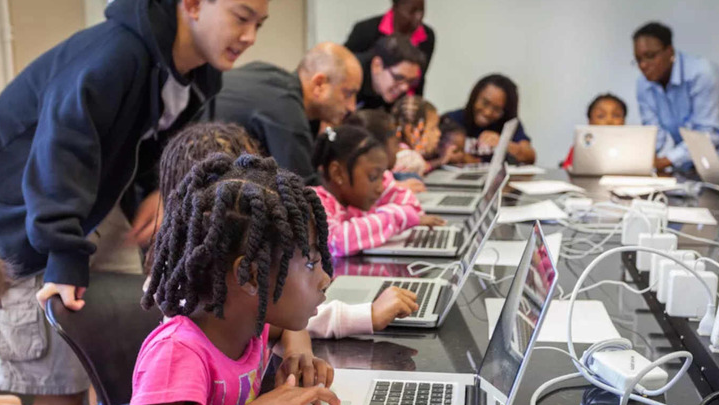
Top Coding Bootcamps for Kids
In today’s digital era, coding has become an essential skill for children to excel in various fields, including technology, science, and problem-solving. To introduce kids to the exciting world of programming and foster their passion for coding, coding bootcamps for kids have emerged as a popular and effective learning platform.
These bootcamps provide structured coding programs, expert guidance, and hands-on projects to help young learners develop their coding skills. In this blog, we’ll explore some of the top coding bootcamps for kids, highlighting their features, programs, and pricing.
BrightChamps
CodeChamps by BrightChamps is an extraordinary platform that ignites young minds with the power of coding. It is a creative wonderland where kids dive into the captivating world of programming classes for kids, and programming games for kids learning to unravel complex algorithms and craft their own digital masterpieces.
Codecademy Kids:
Children between the ages of 7 and 12 can use the interactive coding program Codecademy Kids. It provides a thorough curriculum that exposes coding ideas via fun games and projects.
Kids can pick up programming skills in areas like web development, game design, and data visualization by learning languages like Python and JavaScript. The Codecademy Pro subscription, which costs $19.99 a month, unlocks more content and features. Codecademy Kids offers a free basic plan.
Tynker:
Tynker is a well-liked coding environment for young people (5–17). It provides a huge selection of coding classes that are created to encourage innovation, critical thinking, and problem-solving abilities.
Python, JavaScript, and Scratch are just a few of the programming languages covered in Tynker’s curriculum. Kids may make their own games, animations, and apps using its simple interface. Starting at $8.33 per month, Tynker provides both monthly and annual subscription rates.
CodeWizardsHQ:
For children between the ages of 8 and 18, CodeWizardsHQ offers instructor-led coding courses. Its curriculum offers specialised courses in game creation, web design, and mobile app development in addition to covering a number of programming languages like Python, JavaScript, and HTML/CSS.
Small groups are used for instruction at CodeWizardsHQ, ensuring individualised attention. Price for a 12-month subscription is $149 a month.
Coding with Kids:
For children aged 5 to 18, Coding with Kids is a firm that provides both in-person and online coding training. Python, Java, and Unity are just a few of the coding languages that are covered by their programmes.
Project-based learning is the main focus of Coding with Kids, where students employ their coding abilities on practical projects. With costs starting at $150 per month, they provide a range of subscription options, including monthly and yearly programmes.
ID Tech:
ID Tech is a well-known coding workshop for children and teenagers. It offers coding courses both on-site and online throughout the country. Python, Java, C++, and other programming languages, as well as game development, robotics, and artificial intelligence, are just a few of the coding courses that ID Tech offers.
Children can work together with classmates who share their interests at the camp, promoting a sense of belonging. With choices for day and overnight camps, ID Tech programmes’ costs vary depending on the course and location.
Choosing the Right Coding Bootcamp for Your Child

In today’s digital age, coding skills have become increasingly essential for success in various industries. As a parent, you may be considering enrolling your child in a coding bootcamp to equip them with this valuable skill set. Most of the boot camps even have their coding app for kids to upload lessons and resources.
Coding bootcamps provide a structured learning environment that can accelerate your child’s coding journey. However, with the abundance of options available, it’s crucial to choose the right coding bootcamp for your child’s needs. In this blog post, we’ll explore the factors to consider when selecting a coding bootcamp for your child.
Age and Experience Level:
Your child’s age and experience level should be taken into account when selecting a coding bootcamp for them, as well as considering interests like games for kids to play. While some bootcamps are geared towards more seasoned learners, others are created exclusively for young beginners.
Find a bootcamp that offers an adequate curriculum and matches your child’s current skill level. Bootcamps may effectively engage your child and make sure they don’t feel overwhelmed or bored by using age-appropriate content and teaching techniques.
Learning styles and instructional techniques
Every kid has a different way of learning. While some people could benefit from a regimented classroom environment, others might like self-paced online courses. Consider your child’s preferred learning style before selecting a bootcamp, then pick a course that suits it. Additionally, research the teaching style used at the bootcamp.
Course Content and the Curriculum
When evaluating a coding bootcamp’s quality and applicability to your child’s objectives, the curriculum and course content are extremely important. Find bootcamps that provide a thorough curriculum covering fundamental programming ideas, languages, and practical applications.
Make sure the bootcamp has a strong emphasis on problem-solving, critical thinking, and creativity because these abilities are crucial for a rewarding job in coding. To expand your child’s expertise, take into account bootcamps that expose students to various coding languages and technologies.
Quality of Instructors and Support:
Your child’s learning experience may be significantly impacted by the knowledge and direction of teachers. Make sure the instructors at the bootcamp have a solid history in both teaching and coding by checking their credentials and experience.
Complex ideas can be clearly explained by knowledgeable teachers, who can also provide tailored feedback and inspire your child to do well.
Flexibility and Schedule
Think about the coding bootcamp’s schedule and flexibility. Check to see if the program has options that fit with the other commitments your child has, such as school or extracurricular activities.
Some bootcamps provide evening or online classes, letting your youngster study whenever it’s convenient for them. For older kids with more demanding schedules or for families with several kids, flexibility in scheduling, as well as considering questions for kids, might be beneficial.
Reviews and Reputation
Check out the coding bootcamp’s reputation and read reviews from other parents and students. Look for endorsements or success stories to get an idea of how well the bootcamp teaches coding skills.
A respectable bootcamp will have good reviews, a history of student successes, and perhaps alliances with academic institutions or business leaders. If you want more information to help you decide, consider speaking to parents or students who have taken the bootcamp, or even exploring options like summer camps for kids if you’re considering it for your child.
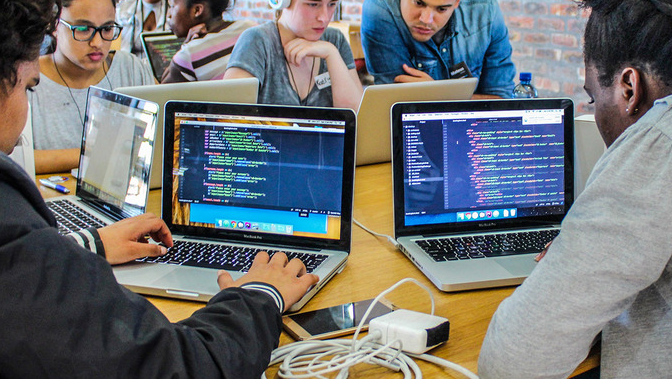
What Your Child Will Learn at a Coding Bootcamp
Coding has become a crucial skill for kids to learn in the modern digital age. It develops their creativity and critical thinking skills in addition to giving them the ability to solve problems. Coding bootcamps have become important learning venues for introducing kids to the world of programming.
We will discuss what your child may anticipate learning at a coding bootcamp in this blog post, as well as some instances of the coding abilities and languages they may pick up in the process.
Introduction to Coding Concepts
At a coding bootcamp, children will start by building a strong foundation in coding concepts. The essential building blocks of programming, such as variables, loops, conditions, functions, and data types, will be taught to them.
They will learn how these ideas operate and how they may be used to address problems in the real world through engaging activities and exercises.
CSS and HTML
The foundation of web development is made up of HTML (Hypertext Markup Language) and CSS (Cascading Style Sheets). HTML for kids will help them to learn how to make web pages in a coding bootcamp, which gives the structure and content, and CSS, which adds visual styling and layout. They will investigate the fundamentals of designing web layouts, adding text and photos, and style aspects to produce websites that are aesthetically pleasing.
JavaScript
A flexible programming language called JavaScript makes it possible for web pages to be interactive. Children will learn JavaScript in a coding bootcamp and become aware of its potential for developing dynamic and interactive web experiences.
They will learn about JavaScript concepts like variables, loops, conditions, functions, and events so they can work with web page elements, manage user input, and develop interesting web apps.
Python
Python is a well-liked, approachable programming language that is renowned for being straightforward and readable. Python is frequently taught to kids in coding bootcamps due to its adaptability and variety of uses. With Python for kids, children can build games, create art, and explore the world of technology in an engaging and accessible manner.
The fundamentals of Python grammar, data structures, and control flow will be taught to kids. To develop their computational thinking abilities, they will work on projects that place a strong emphasis on problem-solving, logical reasoning, and algorithm design.
Game Development
Game development is frequently taught in coding bootcamps as a fun and interesting approach to practise coding skills, often involving the creation of video games for kids. Children will learn how to use platforms or frameworks for game development that use drag-and-drop user interfaces or straightforward coding syntax.
They will investigate ideas including game design, character movement, collision detection, and scoring systems through practical projects. This enables individuals to develop their coding skills while also exercising their creativity.
Project-based learning and cooperation
Coding bootcamps place a strong emphasis on teamwork and project-based learning, which simulates real-world programming situations. Children will participate in group activities where they will gain teamwork, problem-solving, and idea-sharing skills.
They will work on coding projects that put their newly acquired abilities to use, enabling them to gain practical experience and develop a body of work.

Empowering Your Child’s Future: The Power of Coding Bootcamps
In today’s rapidly evolving digital age, coding skills have become increasingly valuable for success in various industries. As parents, we strive to equip our children with the tools they need to thrive in the future job market, including engaging methods like quizzes for kids. One such tool that deserves serious consideration is coding bootcamps. These immersive programs offer a unique learning experience that can shape your child’s education and open doors to promising career prospects. Let’s explore the compelling reasons why investing in coding bootcamps is a wise choice for your child’s future.
Creative Expression and Problem-Solving Skills:
Coding is a creative process that encourages ingenuity and problem-solving abilities, not just the writing of lines of code. Your youngster will start on an explorational trip through coding bootcamps, learning to think critically, dissect challenging problems, and come up with effective answers. These abilities go beyond technology and will be useful in any career they pick.
In-Demand Skills for Future Careers:
With technology impacting businesses at a rapid pace, coding has become a critical competency in a variety of fields. Being proficient in coding opens doors to a variety of job prospects in fields including artificial intelligence, web development, data science, and mobile app development.
By investing in coding bootcamps, you provide your child with a competitive advantage in the job market, empowering them to pursue their passions and secure rewarding, high-demand positions
Collaboration and networking:
Coding bootcamps offer a special setting for your child to meet mentors, peers, and business professionals, creating opportunities for networking alongside engaging in fun activities for kids. These encounters develop a solid peer and professional network that encourages collaboration and inspires creativity.
Your child can make lifelong connections and receive priceless industry knowledge by becoming fully immersed in this thriving environment, laying the groundwork for future success. Coding classes for kids offer a structured pathway for young learners to engage deeply with technology and develop essential skills that are increasingly valuable in today’s digital world.
Conclusion
As parents, our primary goal is to nurture our children’s growth and set them up for a prosperous future. Investing in coding bootcamps is an excellent way to equip them with the skills they need to thrive in the digital era.
By embracing coding education, you empower your child to unleash their creativity, develop problem-solving abilities, and gain in-demand skills that will open doors to exciting career opportunities.
Furthermore, the networking and collaboration opportunities provided by coding bootcamps ensure that your child will be well-prepared to navigate the ever-changing landscape of the tech industry. So, consider coding bootcamps as a valuable investment in your child’s education and future, and watch them soar to new heights in their professional journey.
To get your hands on more such educational and free resources on coding, robotics, game development, etc., do check out the Brightchamps Blog Page now!
Frequently Asked Questions
In a coding bootcamp, your child will learn essential programming skills, problem-solving techniques, and gain hands-on experience in coding languages
Coding bootcamps for kids vary in cost, but many options are available at affordable prices to accommodate different budgets.
The duration of a coding bootcamp for kids can vary, but typically they last for several weeks, providing an intensive learning experience.
Coding bootcamps for kids often teach popular languages like Scratch, Python, JavaScript, and HTML/CSS, focusing on foundational programming concepts.
Most coding bootcamps for kids do not require prior coding experience. They are designed to cater to beginners and provide a solid foundation in coding.
When choosing a coding bootcamp for your child, consider factors such as curriculum, teaching methods, instructor qualifications, reviews, and feedback from other participants.
The student-to-teacher ratio in coding bootcamps for kids is typically kept small to ensure personalized attention and guidance.
Yes, upon completion of a coding bootcamp for kids, your child will typically receive a certificate as recognition of their achievement.
Coding bootcamps for kids are often available year-round, offering flexibility for enrollment beyond just the summer months.
Coding bootcamps can equip your child with valuable coding skills and problem-solving abilities, enhancing their education and opening doors to potential career opportunities in the future.
Yes, coding bootcamps for kids emphasize problem-solving and critical-thinking skills, helping children develop these valuable abilities alongside coding knowledge.


 We are an army of educators and passionate learners from BrightChamps family, committed to providing free learning resources to kids, parents & students.
We are an army of educators and passionate learners from BrightChamps family, committed to providing free learning resources to kids, parents & students.








